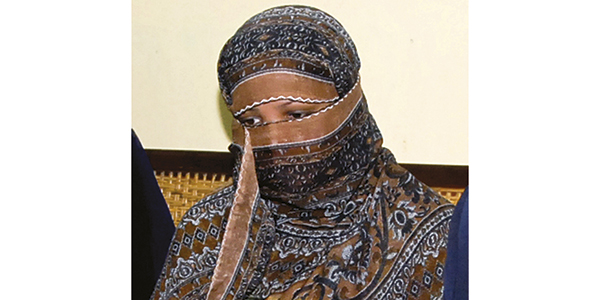Frances salutes ‘martyrs’
Pope Francis says a Catholic woman sentenced to death under Pakistan’s blasphemy laws and a Nigerian woman captured and held for two years by the militant Islamist group Boko Haram are both “martyrs”.
He made the remarks during a private audience in the Vatican on Saturday with the husband and daughter of Asia Bibi (pictured), imprisoned since 2009 for an alleged blasphemy offence against Muhammad. Bibi has always denied the allegations. The family was joined by Rebecca Bitrus, who was held captive by Boko Haram for two years, and who told the Pope that her kidnappers had raped her.
Pope Francis said that Bibi and Bitrus were both martyrs. Before the papal audience Ashiq Masih, Bibi’s husband, said he wanted to appeal to Francis to do “everything he can” to have his wife released, and at the end of the audience, asked the Pope to pray for his wife “and all persecuted Christians”.
The Colosseum in Rome was lit in red on Monday to draw attention to the persecution of Christians around the world.
The Catholic bishops of the Democratic Republic of Congo have issued a statement criticising “a campaign of defamation of the Church”. “The national and international community is witness to a series of campaigns of discredit and defamation, aimed at weakening the moral strength of the Church”, says the statement of 20 February. It also denounces the “bloody repression” of peaceful Catholic-led demonstrations staged in December and January. The protesters – 15 of whom were killed – had challenged President Joseph Kabila to step down and to hold long overdue elections. On Sunday, security forces used live bullets to disperse demonstrations, killing at least two protesters. Soldiers surrounded Kinshasa’s main churches and used teargas and gunfire to try to halt the protests after services.
Around 2,000 Catholics took part in a march led by Archbishop Cardinal Luis Tagle in the Philippines capital of Manila on Sunday, protesting against government moves to legalise divorce and highlighting the violent “war on drugs” by the administration of President Rodrigo Duterte. Participants carried banners and placards with the message “Protect and Defend the Sanctity of Life and Marriage”. The “March for Life” event was replicated in other cities, including Cebu, Davao and Cagayan de Oro. The Government thanked church leaders for holding peaceful marches, saying that Duterte “is open to constructive criticism”.
Monsoon warning
The United Nations and other aid organisations have warned that predicted monsoon rains in Bangladesh could cause a catastrophe for the tens of thousands of Rohingya refugees sheltering in the Cox’s Bazar district (above). “The refugees are living in precarious conditions; their shelters are on hillsides, which will turn to mud when the heavy rains arrive,” Cafod’s emergency response worker in Cox’s Bazar, Zoë Corden, said. “Landslide and flood-risk hazard mapping reveal that at least 100,000 people are in grave danger from these risks and require relocation,” a UN report published last month warned.
In an attempt to keep abortion illegal, South Korea’s Catholics have collected over one million signatures to defend their country’s long-standing anti-abortion law against what they call a growing “culture of death”.
The Catholic Bishops’ Conference of Korea held a special Mass at Myeongdong Cathedral in Seoul on 12 February in support of the petition, gathered over a two-month period.
“This shows how desperate the Church is to fulfil its mission of protecting all forms of life,” said Cardinal Andrew Yeom Soo-jung (above), Archbishop of Seoul, who celebrated the Mass. Abortion is illegal in South Korea with just a few exceptions, such as when a woman has been raped or her health is at risk. However, last year, more than 230,000 people signed an online petition calling for abortion to be legalised. The administration of President Moon Jae-in is to research overturning the ban.
’
Cardinal George Pell’s lawyers were denied access to the prison medical records of a complainant in the case against him less than two weeks before his scheduled committal hearing on sexual abuse charges was due to begin in Melbourne. Magistrate Belinda Wallington denied the request for medical records from Justice Health, which provides medical services in prisons in the State of Victoria, on 21 February. Cardinal Pell, 76, who has been on leave for eight months from his Vatican post as Prefect of the Secretariat for the Economy, is facing historical sexual offence charges involving multiple complainants. He denies all charges. Pell is due to return to the Melbourne Magistrates' Court on 5 March for what is expected to be up to four weeks to determine whether he should stand trial in a higher court. The precise charges have not yet been revealed. The court will be closed to the public for up to two weeks as the complainants give evidence, as required under legislation.
A sculpture of a shirtless Pope Benedict XVI is currently on display in Rome. In an exhibition entitled, “Habemus Hominem”, the sculptor known as Jago shows the retired Pope wearing just his white zucchetto skullcap and the fisherman’s ring – a symbol of the office of the papacy – on his right hand. Jago is a great admirer of the 90-year-old Pope Emeritus. The piece can be seen at the Museo Carlo Bilotti in the Borghese Gardens until 2 April.
The Ukrainian bishop whose diocese includes the rebel-held Donetsk and Luhansk areas has deplored what he says is a diminishing Western concern for his country, and warned that Russia will indefinitely continue the war in eastern Ukraine.
“This war has already lasted four years, and people are dying every day – the world has simply got used to this,” Bishop Stanislav Shyrokoradiuk of Kharkiv-Zaporizhia said.
The largest Orthodox cathedral in the Balkans is to be dedicated later this year in the Romanian capital, Bucharest.
Romanian Orthodox Church leader Patriarch Daniel said the 7,000 sq-ft cathedral, with room for 6,000, would be ten times the size of Bucharest’s existing Patriarchal Cathedral, with pilgrims’ accommodation and a soup kitchen for the poor.



 Loading ...
Loading ...